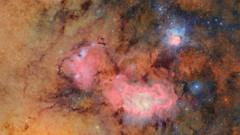A meteorite that struck a private residence in McDonough, Georgia, has been confirmed by scientists to be older than our planet, tracing back to approximately 4.56 billion years ago. Nasa identified the celestial rock, which burst upon entry into Earth’s atmosphere on June 26, drawing attention from locals who witnessed the fireball streaking across the daytime sky. The object created a significant impact, penetrating the roof of a house at a staggering speed, rendering pieces that are now subject to scientific study.
Ancient Meteorite Hits Home, Surprising Scientists with Its Age

Ancient Meteorite Hits Home, Surprising Scientists with Its Age
A meteorite that crashed into a Georgia home is discovered to be older than the Earth itself, sparking intrigue among scientists.
On that fateful day, numerous residents across Georgia reported seeing the meteorite, which traveled at speeds nearing 1 kilometer per second before exploding. Scott Harris, a geologist from the University of Georgia, identified the meteorite as a chondrite—a prevalent type known to be around 4.5 billion years old. Harris commented on the exceptional nature of this find, explaining the significance of modern technology and community vigilance in meteorite recovery efforts.
The homeowner, continuing to discover remnants of the space phenomenon, was astonished to learn that this particular meteorite—dubbed the McDonough meteorite—marks the 27th recovery of its kind in Georgia. Harris, who plans to publish his research on the asteroid’s composition, expressed concerns over potential hazards posed by similar celestial objects, hinting at the need for preparedness against possible catastrophic impacts in the future.
As scientific explorations continue, this incident exemplifies the intriguing interplay between celestial events and everyday life on Earth, guiding our understanding of asteroids and their historical significance.
The homeowner, continuing to discover remnants of the space phenomenon, was astonished to learn that this particular meteorite—dubbed the McDonough meteorite—marks the 27th recovery of its kind in Georgia. Harris, who plans to publish his research on the asteroid’s composition, expressed concerns over potential hazards posed by similar celestial objects, hinting at the need for preparedness against possible catastrophic impacts in the future.
As scientific explorations continue, this incident exemplifies the intriguing interplay between celestial events and everyday life on Earth, guiding our understanding of asteroids and their historical significance.


















